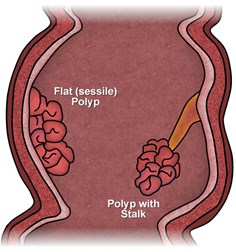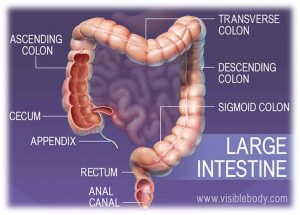Colorectal cancer is an uncontrolled growth of abnormal cells that form masses, called tumors. Cancer is more often found in the colon than in the rectum.

Did You Know?
80%-90% of colorectal cancers start as non-cancerous polyps. Polyps cannot be felt.
Most of the time, there are no symptoms in the early stages of colorectal cancer.
Warning Signs of Colorectal Cancer
- Blood in stool
- Changes in color or shape of stool
- Unusual diarrhea, constipation, or narrowing of stool
- Chronic stomach cramps or sharp pains that don’t gradually go away
- Changes in bathroom habits
- Unexplained weight loss
- Constantly feeling tired
Are You at Risk of Colorectal Cancers?
If any of these risk factors apply to you, please see your doctor about testing for colorectal cancer.
Are you African American?
Fact: African Americans are about 20% more likely to get colorectal cancer.

Is there someone in your family who has (or had) colorectal cancer?
Fact: A family history of colorectal cancer increases your chance of getting colorectal cancer.
Are you 45 or older?
Fact: About 9 out of 10 colorectal cancers happen in people aged 45 or older. In 2021, the CDC lowered the screening age to 45 because of the increase in cases under age 50.
Do you have a type II diabetes?
Fact: African Americans are more likely to have type II diabetes. Those with diabetes are at a higher risk for colorectal cancer.
Cancer Prevention Tips
- All men and women of all racial and ethnic groups aged 45-75 should talk to their provider to decide which colorectal cancer test is right for them.
- Do not sit all day! Get up and move around at least once daily.
- Quit smoking today.
- Limit intake of red meats, fatty foods, and foods high in sodium.
- Consume alcohol in moderation.
- Eat lots of fruits and vegetables.

“I’m the poster child for why you get your colon cancer screening. They discovered a polyp that looked suspicious. It was cancer. I had surgery. I think they took out one foot of my colon. Colon cancer is very slow growing, and my doctor told me that [polyps] had been growing anywhere from 8 to 12 years. I didn’t realize that colon cancer ran in my family. So you have to do your family history. If you really want to take care of your health, knowledge is power.”
– Angela Deaver Campbell, 50
UCLA Health Patient
What can you do? Get checked!
Cancers found early can help save your life. These tests are used to screen for colorectal cancer. The FOBT/FIT is the easiest way to get screened.
- Take-home fecal tests (FOBT or FIT): Stool test kits are done at home and mailed to the lab and checked for signs of blood in your stool. Done once a year, if results are normal.
- Sigmoidoscopy: Your provider will check your rectum and lower colon using a thin, flexible tube. Done every 5 years, if results are normal.
- Colonoscopy: Your provider uses a colonoscope to look for growths called polyps throughout the colon. Done every 10 years, if results are normal.
It is important to talk to your healthcare provider about which screening test is right for you.
Checklist
I pledge to reduce my risk of colorectal cancer by:
- SPREADING THE WORD about colorectal cancer.
- REDUCING red meats and processed foods.
- GETTING TO KNOW my family history.
- EATING fruits and vegetables.
- STOPPING smoking and LIMITING alcohol use.
- EXERCISING regularly.
- Getting SCREENED.
Make this pledge as a commitment to yourself, your loved ones, and your community.
For additional information or copies of this brochure, please contact:
Dr. Luvenia W. Cowart
Principal Investigator
Colorectal Cancer Education Project
Syracuse University
Department of Public Health
315.443.9808
lwcowart@syr.edu
Supported by the Prevent Cancer Foundation and developed in consultation with the Onondaga County Health Department